In a world where urbanization and industrialization are on the rise, clean air has become a precious commodity. Many people spend a significant portion of their day indoors, exposed to poor air quality, or in cities where pollution levels are high. However, the simple act of breathing clean, fresh air can have profound effects on your physical and mental health. Let’s explore some of the major health benefits that come with breathing in clean air.
Improved Respiratory Function
The most obvious benefit of clean air is its positive impact on respiratory health. Polluted air is often filled with harmful particles, such as dust, smoke, and volatile chemicals, which can all aggravate the lungs and make breathing difficult. For individuals with asthma, bronchitis, or other respiratory conditions, exposure to clean air can significantly reduce the frequency and severity of symptoms. Overall, clean air helps ensure that your lungs can efficiently process oxygen, which improves general lung function.
Additionally, on a cellular level, clean air also reduces inflammation in the respiratory tract. This lowers the risk of infections, chronic obstructive pulmonary disease (COPD), and even lung cancer. When we inhale polluted air, harmful chemicals can penetrate the lungs, damaging delicate tissues and causing long-term harm in the process. In contrast, clean air helps the body repair itself by maintaining healthy lung tissue and allowing for more effective oxygen exchange.
Boosts Immune System
Breathing in clean air can also strengthen your immune system. Pollution is known to suppress the body’s natural defenses, leaving individuals more vulnerable to illnesses like the flu, cold, and even chronic infections. By reducing exposure to harmful pollutants, clean air helps the immune system function more effectively. Clean air can enhance white blood cell activity, improve circulation, and help the body ward off pathogens more efficiently. This is especially important in regions with high levels of air pollution, where respiratory infections and diseases are more prevalent. By breathing in air with fewer toxins and irritants, your immune system is given the best chance to perform its vital protective role.
Improved Cardiovascular Health
Clean air doesn’t just benefit the lungs, it also has a direct impact on heart health. Studies have shown that long-term exposure to air pollution is associated with an increased risk of heart disease, high blood pressure, and stroke. Airborne pollutants, including particulate matter (PM2.5), can enter the bloodstream and cause inflammation in the cardiovascular system. This inflammation can lead to plaque buildup in the arteries, raising the risk of atherosclerosis and other cardiovascular conditions. By breathing clean air, you can reduce this inflammation and support a healthy heart. Clean air helps maintain optimal blood pressure, keeps arteries clear, and reduces the strain on the heart, which in turn lowers the likelihood of heart-related health issues.
Enhanced Cognitive Function & Mental Health
Recent research has shown that air pollution can have negative effects on the brain, particularly on cognitive functions such as memory, attention, and problem-solving skills. Exposure to polluted air has been linked to an increased risk of cognitive decline, dementia, and even Alzheimer’s disease. This is because the pollutants in the air can enter the brain, causing inflammation and oxidative stress that damage brain cells. In contrast, breathing clean air has been associated with improved cognitive performance.
Fresh air has a profound effect on mental well-being as well. Research has shown that poor air quality can contribute to feelings of anxiety, depression, and stress. On the other hand, spending time in areas with clean air, such as forests or parks, can promote relaxation and reduce stress levels.
Better Sleep
Quality sleep is essential for good health, and breathing clean air can help promote deeper, more restful sleep. Poor air quality, particularly the presence of allergens or pollutants like carbon monoxide, can disrupt sleep patterns and contribute to conditions such as insomnia or sleep apnea. Clean air, on the other hand, supports better oxygen circulation throughout the body, helping you sleep more soundly and wake up feeling more refreshed.
O2 Nose Filters
One of the most effective ways to protect ourselves from unclean air is by wearing O2 Nose Filters. Fortunately, these filters help prevent harmful particulate matter from entering and potentially affecting your nasal cavities. O2 Nose Filters has been proven in controlled studies to help protect wearers from inhaling airborne particles such as bacteria, viruses, dust, exhaust fumes, smoke, and other pollutants. Independent laboratory tests demonstrate that 3M’s Advanced Electret Media in O2 Nose Filters block 90% of particulates at PM10 and 65% of particulates at PM2.5. Additionally, O2 Nose Filters are comfortable to wear due to their latex-free design and medical-grade Thermoplastic Elastomer (TPE) materials.
O2 Nose Filters provides inexpensive and effective security to protect people from harmful air pollution. While our nasal passageways try their best when it comes to filtering harmful particulate matter, they aren’t perfect. That’s why O2 Nose Filters are such an effective solution when it comes to improving our mental and physical health. Nose filters are a discreet, effective option to protect against air pollutants. The O2 Nose Filter uses 3M’s patented AEM™ electrostatic technology to capture allergens, viruses, and other particulates, making them a valuable tool for anyone who wants to drastically limit the pollutants they breathe in daily.






